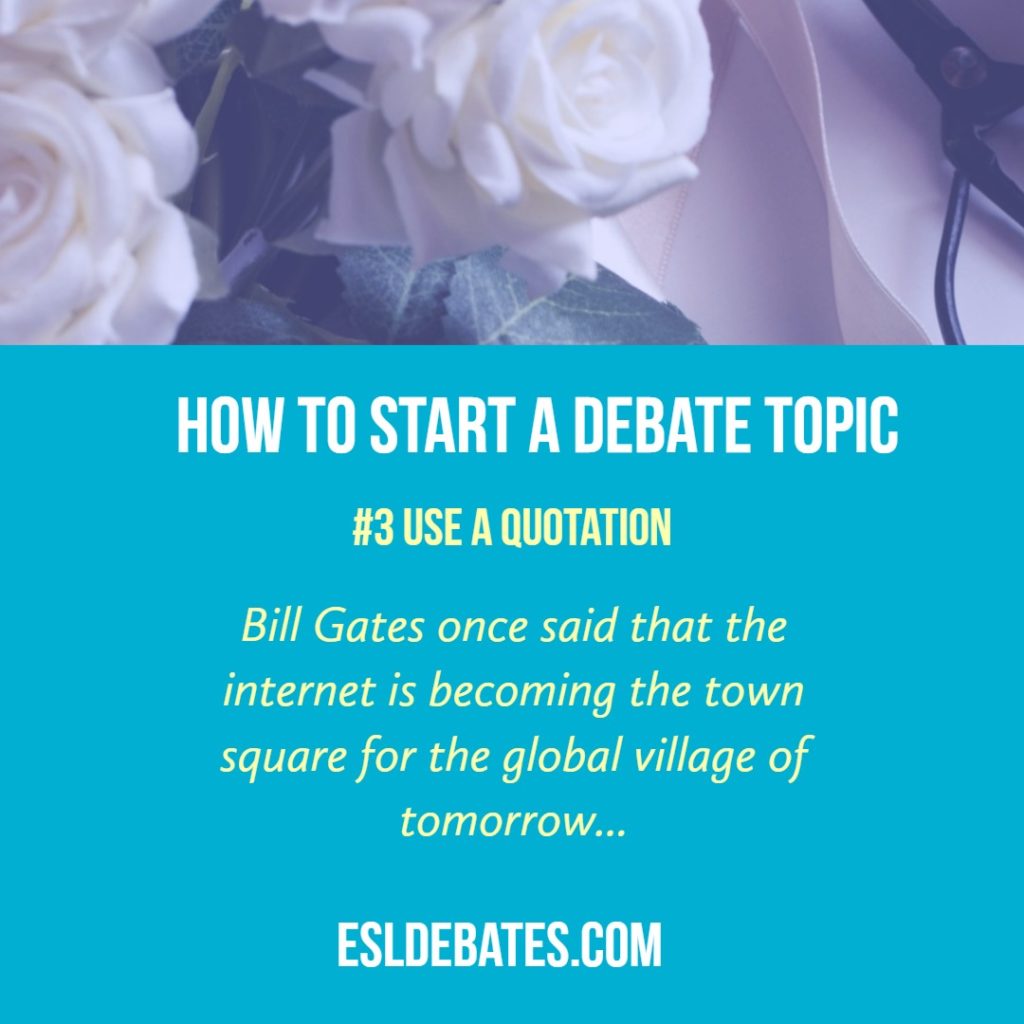- College Essay
- Argumentative Essay
- Expository Essay
- Narrative Essay
- Descriptive Essay
- Scholarship Essay
- Admission Essay
- Reflective Essay
- Nursing Essay
- Economics Essay
Assignments
- Term Papers
- Research Papers
- Case Studies
- Dissertation
- Presentation
- Write My Assignment
- Editing Help
- Cheap Essay Writing
- How to Order
Debate Writing
Debate Speech

Debate Speech - Ultimate Writing Guide For Students

People also read
Debate Writing - A Comprehensive Writing Guide
A List of 190+ Debate Topics and Ideas
Types of Debate - A Complete Overview & Examples
Free Debate Examples for All Academic Levels
10 Debate Tips and Tricks for Students
Advanced Debating Techniques For Students Of All Academic Levels
Struggling to compose an impactful debate speech that captivates your audience and secures a win?
You're not alone. Crafting a persuasive and well-structured debate speech is a challenge faced by numerous students. The process of articulating your thoughts, organizing arguments can be challenging.
However, fear not! This blog post is your comprehensive guide, presenting a step-by-step approach to empower you in constructing a debate speech. We’ve included examples and tips to make sure your speech captures attention and ensures a compelling and victorious performance.
So, keep reading.
- 1. What Is A Debate Speech?
- 2. How To Prepare For Debate Speech?
- 3. Debate Speech Examples for Students
- 4. Tips for an Effective Debate Speech
- 5. Debate Speech Topics
What Is A Debate Speech?
A debate speech is a formal presentation where you argue for or against a specific topic.
It involves structured arguments presented in different sections, aiming to persuade the audience with facts and convincing points. It's a way of discussing and trying to show why your side is the right one on a particular subject.
Key Elements of A Debate Speech
A debate typically includes several essential elements to communicate your position and persuade the audience effectively. These elements form the building blocks of a strong debate speech:
- Opening Statements: These kick off the debate, presenting the main arguments for your side or against the motion. It sets the tone for the discussion.
- Rebuttals: In this stage, you respond to the opposing side's arguments, highlighting weaknesses or presenting counterpoints.
- Summary: Towards the end of the debate, a summary is provided to reinforce your main arguments and explain why your perspective is stronger. This section aims to leave a lasting impression on the audience.
- Use of Evidence: Supporting your arguments with evidence, facts, and examples strengthens your position and makes your speech more convincing.
- Logical Reasoning: Presenting arguments in a clear, logical sequence enhances the coherence and persuasiveness of your speech.
- Rhetorical Appeal: Adding appeals like ethos, pathos and logos to your speech can engage the audience, making your points more relatable and impactful.
How To Prepare For Debate Speech?
Creating a compelling debate speech requires a methodical approach that ensures a clear, convincing, and organized presentation. Let's dig deep into the detailed steps for an effective preparation:
Choosing a Position
Start by selecting a clear stance or position regarding the debate topic. Decide whether you are arguing for or against the motion. Understanding and committing to your position forms the foundation of your speech.
Conducting Thorough Research
Gathering information for your debate speech is really important. Look at different sources like books, reliable websites, and experts' ideas.
Find facts, numbers, and real stories that support what you want to say. It's key to use strong and trusted information that backs up your side of the argument.
When you collect different types of information, it makes your speech stronger and more convincing. This way, you'll be well-prepared to explain your ideas during the debate.
Structure The Key Points
After researching and collecting points, organize your main arguments in a clear and logical manner to effectively convey your position in the debate. Set a sufficient time for each key point to ensure they're adequately developed and presented.
You can do this by following a debate format. Here is a standard debate speech format for a 15-20 minute debate:
How to Start a Debate Speech
Crafting a convincing opening for your speech involves capturing the audience's attention while introducing key points of discussion.
You can achieve this by using attention-grabbing techniques such as sharing an eye-opening fact, a powerful quote, or a personal anecdote related to the topic.
Additionally, it's beneficial to briefly outline the key areas of discussion that you'll cover in your speech. By providing a sneak peek of the main points, you offer the listeners a roadmap of what's to come.
This not only piques the audience's interest but also helps them anticipate and follow the structure of your speech.
Structure Your Arguments
Structuring arguments in the debate speech means organizing your ideas in a way that makes sense to others.
A well-structured argument often uses the P-E-E format, which stands for Point, Evidence, and Explanation:
- Point or Reason: Begin by stating your main argument or reason. This is the central idea you want to convey in support of your position.
- Evidence: Provide evidence, facts, or examples that support your point. This evidence should be reliable and back up what you're saying.
- Explanation: Explain how your evidence supports your point. Make it clear to your audience why this evidence is important and how it links to your argument.
This structure helps make your arguments more persuasive and clear. It enables you to present your points effectively, support them with evidence, and explain why that evidence matters in the context of your argument.
Address Counterarguments (Rebuttals)
Addressing counterarguments involves anticipating opposing viewpoints and crafting responses, known as rebuttals , within your speech. A rebuttal is a persuasive counter-argument that challenges or opposes the points raised by the other side.
By thinking ahead and having strong responses, you showcase a comprehensive understanding of the subject matter.
This approach makes your argument stronger and shows your skill in defending your position, uplifting your speech's credibility.
How to End a Debate Speech
Concluding your debate speech effectively is as important as starting it strong. Here are two impactful ways to conclude your speech:
- Summarize Key Points with a Call to Action (CTA) Example: "In conclusion, the evidence overwhelmingly supports the idea that [your stance on the topic]. As we leave here today, let's not merely acknowledge the importance of [debate topic] but commit to [call to action], ensuring a brighter future for all."
- End with a Powerful Quote or Statement Example: "As [relevant figure] once wisely said, '[insert impactful quote].' Let these words guide us in our understanding of [debate topic]. Together, we can [highlight the desired outcome or change]."
Review And Practice
The last step is to review and practice a lot. Read through your speech to make sure it all makes sense and fits the time limit.
Practice how you talk, how fast or slow, and how you use your body while speaking. Also, be ready to answer questions or handle different arguments.
Do a few final practice rounds to feel more confident and comfortable. This way, you'll be well-prepared and ready to deliver a strong debate speech.
Debate Speech Examples for Students
For students, understanding how to structure and present a debate speech is crucial. Here are some debate speech samples to help you grasp the basics of debating:
First Speaker Debate Speech Example
2nd Speaker Debate Speech Example
3rd Speaker Debate Speech Example
Prime Minister Debate Speech Example
Short Example Of Debate Speech
Debate Speech On Social Media
Debate Speech Class 11
Debate Speech Structure
Examples can serve as a great starting point. Check out more expertly crafted debate examples for inspiration!
Tips for an Effective Debate Speech
Writing a persuasive and impactful debate speech requires careful consideration and strategic planning. Here are key tips to enhance the effectiveness of your presentation:
- Tailor language to match the audience's demographics and interests.
- Strengthen arguments with credible sources and diverse perspectives.
- Organize with a clear introduction, well-developed body, and strong conclusion for a logical flow.
- Capture attention with an influential quote, question, or anecdote.
- Support arguments with relevant statistics, examples, and real-world scenarios.
- Anticipate opposing viewpoints and incorporate strong rebuttals.
- Clearly articulate and repeat key ideas to reinforce your stance.
- Maintain a dynamic and engaging delivery by varying tone and pace.
- Pay attention to body language, eye contact, and gestures.
- Allocate time wisely for each speech segment to secure a well-paced presentation.
- Be prepared to adapt to unexpected changes during the debate.
- Practice multiple times to build up clarity, emphasis, and pacing, boosting confidence.
Need to polish your debate? Have a look at this in-depth blog on debate techniques and get effective tips!
Debate Speech Topics
Here are some unique topic ideas for you to write a debate on.
- Credit cards are more harmful than debit cards.
- We are becoming too dependent on technology.
- Marriage is an outdated concept.
- Homework is necessary with regard to the learning process.
- Being a college graduate in the United States is necessary for a successful career.
- It is a good idea to have laptops in classrooms.
- Facebook is a better social platform than Twitter.
- Cell phones can be used as educational tools.
- Junk food must be banned in high schools and colleges.
- The Prime Minister of any state enjoys more power than the president.
Can’t pick a topic? Check out this extensive blog with multiple debate topics and get unique ideas!
You are now better equipped to confidently prepare and deliver your upcoming debate speech.
However, if public speaking isn’t your strong suit or it feels overburdening, our professional custom essay writing service is here to help.
Simply reach out to our expert writers with a request to ' write my speech ' and receive a persuasive and effective piece of writing. Plus, with our satisfaction guarantee, you can get your speech revised as many times as you want.
So, order now from our speech writing service , and let us help you deliver a winning speech.

Frequently Asked Questions
How to write a debate speech.
To write a debate speech:
- Start by clearly defining your stance on the topic.
- Structure your speech with an introduction that grabs attention.
- Put forward your arguments supported by evidence.
- Address counterarguments to strengthen your position.
- Use a strong, persuasive tone and maintain logical flow throughout.
- Conclude with a compelling summary of your key points, reinforcing why your side of the debate is correct.
- Keep the speech within the time limit and practice for effective delivery.
What is an example of a debate statement?
An example of a debate statement is:
"Social media platforms do more harm than good to mental health."
This statement clearly presents a position on an issue that can be supported with arguments and evidence, while also allowing room for the opposing side to present counterarguments.
What is the standard debate speech template?
A standard debate speech template includes:
- Introduction: Greet the audience and judges, state the topic, and present your stance.
- Arguments: Outline 2-3 key points, each backed with evidence, statistics, or examples.
- Counterarguments: Address opposing views and refute them with logic and facts.
- Conclusion: Summarize your main points and restate your stance confidently.
This format ensures clarity, structure, and persuasion throughout the speech.
How to improve confidence while delivering a debate speech?
To be confident in a debate speech:
- Practice thoroughly to know your arguments well.
- Maintain good posture, make eye contact with the audience, and speak clearly at a steady pace.
- Use gestures to emphasize points, avoid filler words, and stay composed even when addressing counterarguments.
Remember, confidence comes from preparation and calm, focused delivery.
What’s the best way to memorize a debate speech?
To memorize a debate speech:
- Break it into key sections or ideas.
- Practice by rehearsing each section aloud multiple times.
- Use mnemonic devices, visual cues, or flashcards to recall key points.
- Regularly recite the speech in front of others or a mirror to simulate real conditions.
- Finally, focus on understanding your arguments deeply, which helps in recalling them naturally without relying on word-for-word memorization.
Is it important to maintain a positive tone during a debate?
Yes, talking positively in a debate helps you stay persuasive and professional. A respectful and constructive tone makes your arguments more convincing and helps engage the audience. Avoid negativity or personal attacks, as they can weaken your credibility. Focus on presenting your ideas clearly and confidently while maintaining a respectful attitude toward your opponents.

Write Essay Within 60 Seconds!

Cathy has been been working as an author on our platform for over five years now. She has a Masters degree in mass communication and is well-versed in the art of writing. Cathy is a professional who takes her work seriously and is widely appreciated by clients for her excellent writing skills.
Struggling With Your Paper?
Get a custom paper written at
With a FREE Turnitin report, and a 100% money-back guarantee
LIMITED TIME ONLY!
Keep reading

OFFER EXPIRES SOON!

Share an amazing fact
Grabbing your audience’s attention is a great tactic too. During a debate, you can greatly improve your side’s position by giving facts, data, and statistics to bolster your points. If the facts are in your favour then you ought to argue the facts.
- The average person in the UK only has 12 weeks worth of their income saved in the bank…
- The average person spends 36% of their life asleep. For students, that’s a lot more.
- Did you know that at least 60% of girls interviewed said that they have an unhealthy relationship with their body image…
- If you had to make a guess to how people die each year as a result of legal drug use in the entire world. What would you guess? Perhaps, 10,000 a year? Well, according to a UN report, the number was over 200,000 each and every year.
- There are approximately 20 million Americans who suffer from hyperthyroidism. The drug which helps their condition, Synthroid, and so prevents them from entering a dangerous coma, was developed with the help of animal testing from dogs, mice, and rats. Without this drug, these people would live a life of uncertainty and in fear of premature death.

Use a quotation
Using the words of others can be the most succinct way to summarise a topic or idea. It also adds weight and a reputation behind your argument.
- Over the last 20 years, the number of people who are keenly changing their diet is steadily on the rise. Ellen DeGeneres notably became a vegan as she said in her own words after seeing “footage of what really goes on in the slaughterhouses and on the dairy farm”. The notion that eating meat is becoming less important…
- Parents, teachers and those in government often seek to end the public’s love affair with video games. While their fears are unfounded on fast, what is true that games can improve our mental development. Jane McGonigal, a game developer and psychologist, had this to say. “A game is an opportunity to focus our energy, with relentless optimism, at something we’re good at (or getting better at) and enjoy. In other words, gameplay is the direct emotional opposite of depression.”…
- There are many who refute the practicalities of space exploration, saying that it is not profitable and lacks the ability to fund the economy. Entrepreneurs like Elon Musk have openly agreed that “we are at the dawn of a new era in commercial space exploration”. It is becoming clearer with the passing years that commercial space exploration is financially viable.
- “The media’s the most powerful entity on earth. They have the power to make the innocent guilty and to make the guilty innocent, and that’s power. Because they control the minds of the masses”. Words uttered half a century ago by Malcolm X, while referring to a different time and context, still rings true today.

Ask a question
Starting with a question engages your audience and gets them to think in a particular frame of mind. Winning debates is sometimes down to the perspective you are able to offer your audience.
- How many of you are creative? How many of you can write a symphony? How many of you possess genius-like math abilities? AI can do all of those things and more…
- Have you ever wondered how important the ocean is in our lives? The oceans provide half the oxygen we breathe and feed more than 2 billion people each day…
- Where did you hear about Meghan Markle and Prince Harry’s marriage announcement? Was it on the radio? How about on TV? Well, if you’re under 35 the chances are that you found out on Twitter or on Facebook…

State a problem
Giving a clear idea of the
- It’s clear that our global civilisation is coming of age, we are communicating faster, doing business quicker, and learning volumes each and every day. That said, the trade in black market goods and services is not diminishing. What we choose to do with the internet can change the world.
- Technology that can be used to help people freely communicate in oppressive societies is the same technology that can be used to oppress freedom of speech. This is a problem we as a society need to resolve…

Using these five ways can really help you make a difference in your debating style and with some luck persuade your audience. let us know in the comments below how your debate went.
- how to start a debate
Read and Debate: Addressing Economic Challenges and Inflation
Navigating the ai revolution: 45 debating topics on the future of humanity in a machine-driven world, overcoming language barriers in debates: tips for expressing ideas clearly and confidently, debating the future: 145 debates critical conversations on technology, innovation, privacy, and ethical technology, 9 powerful words to help you win an argument, leave a reply.
Save my name, email, and website in this browser for the next time I comment.
- Privacy Policy
- Earnings Disclaimer
Most recent
Most popular, 30 debates on women and gender equality, 60 controversial discussion topics with teaching ideas, 56 debating topics on religion and faith, 80 debating topics on the environment.
© ESL Debates 2022 - All rights reserved.

IMAGES
VIDEO